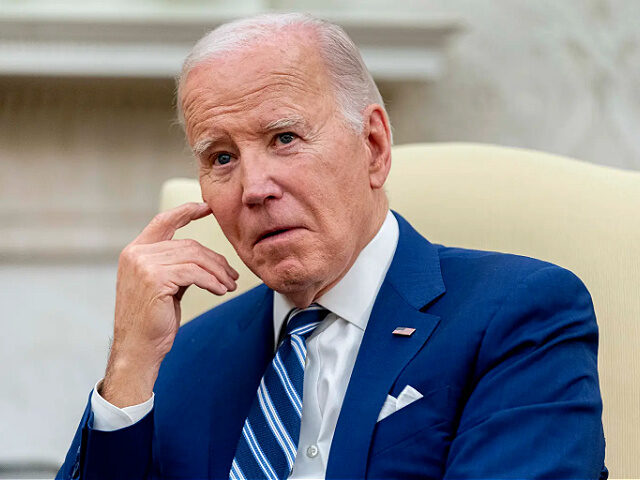President Joe Biden continues to insist that a Palestinian state emerge at the end of Israel’s war with Hamas, despite the fact that doing so would reward Hamas for the terror attack of October 7, and encourage similar attacks — and not just against Israelis.
The idea of a Palestinian state has become something of a fetish in foreign policy circles. In the latter years of the George W. Bush administration, the conventional wisdom — uniting the old establishment right with the new anti-war left — was that resolving the Palestinian issue would solve all of the other problems in the Middle East.
President Donald Trump, too, tried to arrange the “deal of the century” and a two-state solution– before concluding that the Palestinians were not really interested. He dropped the idea.
The result: the Abraham Accords, creating peace and normal diplomatic relations between Israel and several Arab and Muslim states.
The lesson: a Palestinian state is not a necessary condition for peace in the Middle East.
Saudi Arabia learned that lesson, which is why, on the verge of a deal with Israel, Saudi Crown Prince Mohammed bin Salman (MBS) insisted only on improving living conditions for Palestinians, not a Palestinian state.
The only ones who did not learn were Biden and the wonks around him.
In fact, just before October 7, reports emerged that the White House was blocking a Saudi-Israeli peace deal because the Biden administration was insisting on a Palestinian state. (Notably, not one new country has joined the Abraham Accords under Biden.)
Many Israelis, too, were once enamored of the idea of a Palestinian state, believing it might represent the end of the conflict that has troubled locals for the past century. As recently as 2012, 61% of Israelis supported a Palestinians state; 30% opposed it.
Now the proportions are exactly the opposite: 65% oppose a Palestinian state, and 25% support it.
The reason for the shift is simple: Palestinians used their control of Gaza to launch rockets and terror attacks against Israel rather than building their own future.
Those who excuse this behavior claim that Palestinians have the right to “resist” because they are still “occupied” by Israel, even though the last Israeli soldiers and settlers left Gaza in 2005. They point to the fact that Israel (and Egypt) have blockaded Gaza since 2007.
That is not “occupation”: it is a response to the fact that Hamas, a terrorist organization funded and armed by Iran, launched a coup and took over Gaza, importing weapons and diverting civilian goods, like cement, to build its terror tunnels.
Over in the West Bank, the Palestinian Authority — run by the supposedly more “moderate” Fatah organization — has not done much better. Its police force — armed and trained by the U.S. — suppresses some terror against Israel. But the government itself pays stipends to Palestinian terrorists and pensions to their families.
Faced with the loss of U.S. aid unless “pay-to-slay” was stopped, corrupt Palestinian Authority president Mahmoud Abbas — now in the 20th year of his first four-year term — refused.
It is impossible to observe the behavior of Palestinian leaders, Palestinian terrorists, and pro-Palestinian activists in the West and not to conclude that Palestinians do not actually want a state.
They rejected the United Nations partition plan in 1947; they reject Israel’s right to exist today.
Moreover, they do nothing — nothing — to build their own institutions, to invest in their economy, or to educate their children to build their future. Instead, they indoctrinate children to hate Jews and aspire to jihad against Israel.
Palestinian nationalism is actually a rather shallow concept. It began as pan-Arab nationalism, a vague desire to affiliate with the rest of the Arab world. “Palestinian” typically meant “Jewish” until 1948; what we call “Palestinian” identity today emerged later.
There are no Palestinian national holidays, except “Nakba Day,” which marks Israeli independence. The very idea of the “Nakba” — the “catastrophe” of 1948 — is an attempt to appropriate the Holocaust, which Palestinians think is the only reason Israel exists.
There is a Palestinian people, but they are divided — between the Islamists of Hamas and the nationalists of Fatah, the peasants of Gaza and the elites of Ramallah. The only thing that unites them is hostility to Israel.
That, by itself, is not sufficient to sustain the goal of building an independent state.
And what kind of state?
Note that the Biden administration, the European Union, and the United Nations never ask that question, nor do they ask Palestinians to contribute anything toward their own self-determination.
There may be a Palestinian state one day. But it will require that Hamas be destroyed and the Iranian regime be blocked from meddling. It will also require the de-radicalization — the de-Nazification — of the Palestinian population, which will be impossible while ideologues pontificate from abroad.
Netanyahu is right and Biden is wrong: whatever else a Palestinian state might be, it is not an answer to this conflict. And the world cannot want a Palestinian state more than Palestinians want one themselves.
Joel B. Pollak is Senior Editor-at-Large at Breitbart News and the host of Breitbart News Sunday on Sirius XM Patriot on Sunday evenings from 7 p.m. to 10 p.m. ET (4 p.m. to 7 p.m. PT). He is the author of the 2021 e-book, “The Zionist Conspiracy (and how to join it),” now updated with a new foreword. He is also the author of the recent e-book, Neither Free nor Fair: The 2020 U.S. Presidential Election. He is a winner of the 2018 Robert Novak Journalism Alumni Fellowship. Follow him on Twitter at @joelpollak.

COMMENTS
Please let us know if you're having issues with commenting.